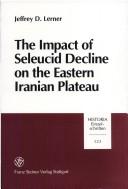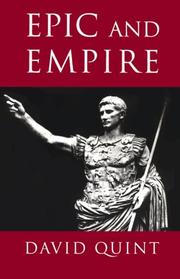| Listing 1 - 6 of 6 |
Sort by
|
Periodical
ISSN: 11286342 17241928 Year: 1999 Publisher: Pisa Fabrizio Serra.
Abstract | Keywords | Export | Availability | Bookmark
 Loading...
Loading...Choose an application
- Reference Manager
- EndNote
- RefWorks (Direct export to RefWorks)
Periodicals --- Antiquities. --- Parthia --- Antiquities --- Civilization --- Civilization. --- Iran
Book
ISBN: 8871664426 9788871664422 Year: 1998 Volume: 1 6 Publisher: Firenze Casa editrice le lettre
Abstract | Keywords | Export | Availability | Bookmark
 Loading...
Loading...Choose an application
- Reference Manager
- EndNote
- RefWorks (Direct export to RefWorks)
Coins, Parthian --- Seleucids --- Parthia --- Antiquities --- Coins, Parthian. --- Seleucids. --- Antiquities. --- Parthia - Antiquities
Book
ISBN: 0897222393 9780897222396 Year: 1990 Volume: 165 Publisher: New York American Numismatic Society
Abstract | Keywords | Export | Availability | Bookmark
 Loading...
Loading...Choose an application
- Reference Manager
- EndNote
- RefWorks (Direct export to RefWorks)
Coin hoards --- Numismatics --- Catalogs. --- J. Paul Getty Museum --- J. Paul Getty Museum, Malibu --- Catalogs --- Copper coins --- Coins [Ancient ] --- Iran --- Coin hoards - Iran - Parthia - Catalogs. --- Numismatics - Iran - Parthia - Catalogs.

ISBN: 3515074171 9783515074179 Year: 1999 Volume: 123 Publisher: Stuttgart : Franz Steiner,
Abstract | Keywords | Export | Availability | Bookmark
 Loading...
Loading...Choose an application
- Reference Manager
- EndNote
- RefWorks (Direct export to RefWorks)
Parthians. --- Seleucids. --- Coins, Greek --- Parthes --- Séleucides --- Monnaies grecques --- Bactria --- Iran --- Bactriane --- History. --- Antiquities --- History --- Histoire --- Antiquités --- -Seleucids --- Greek coins --- -Parthia --- -History --- Séleucides --- Antiquités --- Seleucids --- Parthia --- Baktrii︠a︡-Tokharistan --- Bactriane-Tokharistan --- Bactriana --- Zariaspa --- Battriana --- Coins, Greek - Bactria. --- Seleucides --- Histoire ancienne
Book
ISBN: 9783525533864 3525533861 9783525533871 352553387X 9783525533888 3525533888 Year: 2010 Publisher: Göttingen Vandenhoeck & Ruprecht
Abstract | Keywords | Export | Availability | Bookmark
 Loading...
Loading...Choose an application
- Reference Manager
- EndNote
- RefWorks (Direct export to RefWorks)
Parthians --- History --- Parthia --- 935.6 --- 22.014*2 --- Geschiedenis van de Parthen, Hyrcanië --- Bijbel: geschiedenis en tekstkritiek van de grondtekst en vroege vertalingen --- 22.014*2 Bijbel: geschiedenis en tekstkritiek van de grondtekst en vroege vertalingen --- 935.6 Geschiedenis van de Parthen, Hyrcanië

ISBN: 0691015201 Year: 1992 Publisher: Princeton, N.J. Princeton University Press
Abstract | Keywords | Export | Availability | Bookmark
 Loading...
Loading...Choose an application
- Reference Manager
- EndNote
- RefWorks (Direct export to RefWorks)
Alexander the Great, according to Plutarch, carried on his campaigns a copy of the Iliad, kept alongside a dagger; on a more pronounced ideological level, ancient Romans looked to the Aeneid as an argument for imperialism. In this major reinterpretation of epic poetry beginning with Virgil, David Quint explores the political context and meanings of key works in Western literature. He divides the history of the genre into two political traditions: the Virgilian epics of conquest and empire that take the victors' side (the Aeneid itself, Camoes's Lusíadas, Tasso's Gerusalemme liberata) and the countervailing epic of the defeated and of republican liberty (Lucan's Pharsalia, Ercilla's Araucana, and d'Aubigné's Les tragiques). These traditions produce opposing ideas of historical narrative: a linear, teleological narrative that belongs to the imperial conquerors, and an episodic and open-ended narrative identified with "romance," the story told of and by the defeated. Quint situates Paradise Lost and Paradise Regained within these rival traditions. He extends his political analysis to the scholarly revival of medieval epic in the late eighteenth and nineteenth centuries and to Sergei Eisenstein's epic film, Alexander Nevsky. Attending both to the topical contexts of individual poems and to the larger historical development of the epic genre, Epic and Empire provides new models for exploring the relationship between ideology and literary form.
Epic poetry --- Literary form. --- Literature and history. --- History and criticism. --- Genres [Letterkundige ] --- Genres [Literaire ] --- Genres littéraires --- Geschiedenis en literatuur --- Geschiedenis en poëzie --- Histoire et littérature --- Histoire et poésie --- Letterkundige genres --- Littérature et histoire --- Poésie et histoire --- Poëzie en geschiedenis --- Poetry --- History --- History and criticism --- Literature and history --- Literary form --- Politiek. --- Epiek. --- Epic poetry. --- 17.86 literary genres, theory of genre. --- Heroic poetry --- History and literature --- History and poetry --- Poetry and history --- Form, Literary --- Forms, Literary --- Forms of literature --- Genre (Literature) --- Genre, Literary --- Genres, Literary --- Genres of literature --- Literary forms --- Literary genetics --- Literary genres --- Literary types (Genres) --- Literature --- Acoma pueblo. --- Ahl, Frederick. --- Ancients and Modems. --- Ascoli Piceno. --- Barchiesi, Alessandro. --- Barlow, Joel. --- Bentley, Richard. --- Borges, Jorge Luis. --- Brecht, Bertolt. --- Brooks, Peter. --- Caesar, Julius. --- Caesarion. --- Carausius. --- Cicero. --- Cleanthes. --- Dias, Bartolomeu. --- Donation of Constantine. --- Duggan, Joseph. --- Eikon Basilike. --- Empson, William. --- Este family. --- Fawkes, Guy. --- Fowler, Alastair. --- Fronde. --- Getto, Giovanni. --- Guarini, Battista. --- Góis, Damião de. --- Hartman, Geoffrey. --- Herodotus. --- Horace. --- Jamestown settlement. --- Josephus. --- Kalevala. --- Lagos, Ramona. --- Leo X, Pope. --- Loyola, Ignatius. --- Martello, Francesco. --- Michel, Francisque. --- Moctezuma. --- Naevius. --- Napoleon Bonaparte. --- New Historicism. --- Onate, Juan de. --- Parthia and Parthians. --- Peisistratus. --- Polybius. --- Quintilian. --- anabaptism. --- census. --- civil war. --- history and narrative. --- imitation.
| Listing 1 - 6 of 6 |
Sort by
|

 Search
Search Feedback
Feedback About UniCat
About UniCat  Help
Help News
News